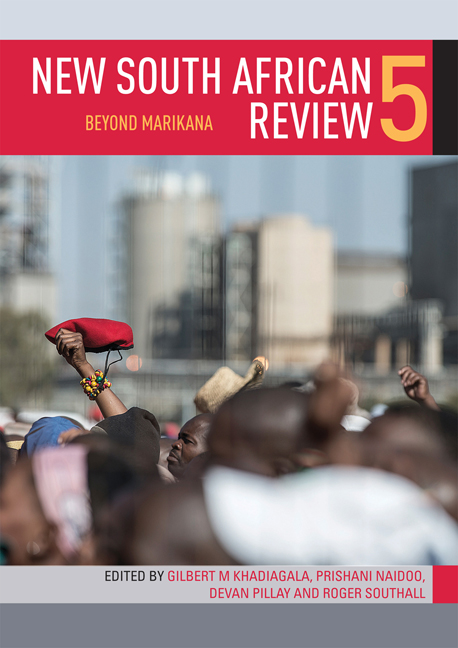Book contents
- Frontmatter
- Contents
- Preface
- Introduction: Political reconfigurations in the wake of Marikana
- PART 1 NEW POLITICAL DIRECTIONS?
- PART 2 ECONOMY, ECOLOGY AND LABOUR
- PART 3 STATE AND SOCIETY
- Introduction to Part 3
- Chapter 8 Constitutionalism: An ‘unqualified human good’?
- Chapter 9 People's Parliament? Do citizens influence South Africa's legislatures?
- Chapter 10 Corruption
- Chapter 11 Marikana and the politics of public order policing
- Chapter 12 ‘In December we are rich, in January we are poor’: Consumption, saving, stealing and insecurity in the kasi
- PART 4 SOUTH AFRICA IN THE INTERNATIONAL ARENA
- Contributors
- Index
Chapter 8 - Constitutionalism: An ‘unqualified human good’?
from PART 3 - STATE AND SOCIETY
Published online by Cambridge University Press: 21 April 2018
- Frontmatter
- Contents
- Preface
- Introduction: Political reconfigurations in the wake of Marikana
- PART 1 NEW POLITICAL DIRECTIONS?
- PART 2 ECONOMY, ECOLOGY AND LABOUR
- PART 3 STATE AND SOCIETY
- Introduction to Part 3
- Chapter 8 Constitutionalism: An ‘unqualified human good’?
- Chapter 9 People's Parliament? Do citizens influence South Africa's legislatures?
- Chapter 10 Corruption
- Chapter 11 Marikana and the politics of public order policing
- Chapter 12 ‘In December we are rich, in January we are poor’: Consumption, saving, stealing and insecurity in the kasi
- PART 4 SOUTH AFRICA IN THE INTERNATIONAL ARENA
- Contributors
- Index
Summary
… the rule of law itself, the imposing of effective inhibitions upon power and the defence of the citizen from power's all-intrusive claims, seems to me to be an unqualified human good.
INTRODUCTION
In January 2014 President Jacob Zuma was quoted in the media as telling African National Congress (ANC) supporters in KaNyamazane, near Nelspruit: ‘We want a huge majority [in the election] this time because we want to change certain things that couldn't be changed with a small majority so that we move forward because there are certain hurdles. People talk about a constitution they have never seen. We saw that constitution.’ Zuma's spokesperson, Mac Maharaj, immediately responded to these reports, telling the Mail & Guardian that President Zuma ‘did not use the word “constitution”’ in his speech. Maharaj denied that Zuma had actually said ‘he wants to change the constitution’ (Mail & Guardian, 10 January 2014). This incident illustrates that while in mainstream political discourse general support for constitutionalism and the values enshrined in the South African Constitution are taken as a given, political points can nevertheless be scored by questioning the fact that the Constitution places limits on the exercise of power by the executive and legislature.
When politicians who serve in government express concern about the manner in which the Constitution limits their powers and directs them to take certain actions to realise the rights of all who live in South Africa, they often do so out of political expediency. However, this does not mean that serious questions should not be asked about the efficacy, or the nature and effects of, constitutionalism. Can constitutionalism be squared with the achievement of progressive social change, or is it an inherently conservative project? Given its emphasis on constraining the exercise of public power, does constitutionalism not hamper transformative social change instead of facilitating it? How democratic is the project of constitutionalism when unelected judges are given the power to declare invalid the acts of the democratically elected legislature or the indirectly elected members of the executive? Can constitutionalism effectively check the power and influence of private institutions – including big business – that play a decisive role in how social relations are structured in society?
- Type
- Chapter
- Information
- New South African Review 5Beyond Marikana, pp. 151 - 170Publisher: Wits University PressPrint publication year: 2015



